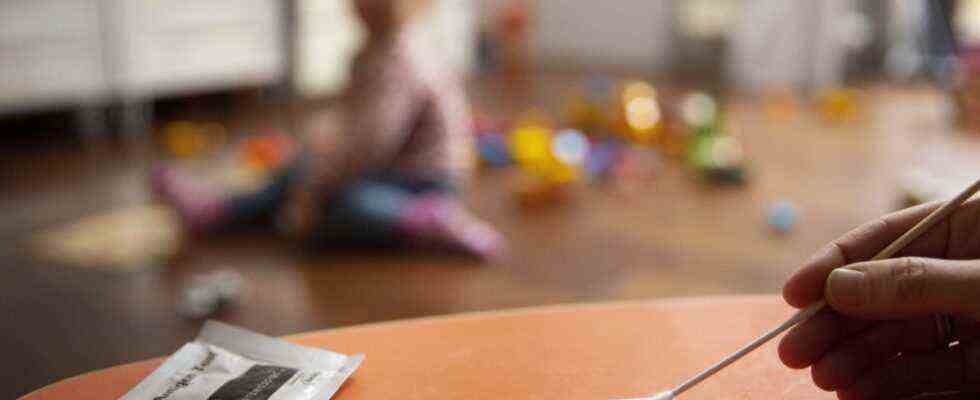Annabelle Stey advocates compulsory testing in childcare facilities – both as a mother who has to carry out the regular tests with her two-and-a-half-year-old son and as a teacher who has to check the regulation from next Monday. For the woman from Vierkirchen, the innovation means an important and long overdue protective measure for the employees in the childcare facilities. “I have a risk patient myself at home and of course I don’t want to drag everything home with me,” she says. With the compulsory test, the infection process should now be easier to control and contain, even in the smallest. But controls of the measure are exactly what Stey says is missing.
From next Monday, January 10th, the compulsory test will apply in daycare centers as well as with child minders. Parents must test their children from one year of age who are in childcare and are not fully vaccinated or have recovered three times a week and provide evidence of this at the respective facility. If this does not happen, the facility is called upon to exclude the child from care. There is still disagreement in the Dachau district about how the regulation should be implemented in everyday kindergarten life. The basic tenor, however, is not only positive at Stey: Compulsory testing means more safety for everyone involved – at least in theory.
Because even if the basic structures are determined by the Free State, it is ultimately the communities and providers of the childcare facilities themselves that decide how the tests are actually implemented in the respective houses. The facilities have already issued authorization certificates to the parents in advance, which they can use to obtain the tests from the pharmacies without additional payment. Max Haberl, Head of School, Childcare, Youth, Social Affairs and Sport in the City of Dachau, who is responsible for testing the twelve municipal day-care centers in Dachau, has already worked out a specific timetable: the parents carry out and confirm the self-tests on their children at home in a letter with your signature that this has a negative result. A list of signatures is therefore uniformly presented to the municipal institutions. A conscious decision was made to do this, explains Haberl, so that the employees would not have to “fiddle” with the test cassettes they had brought with them, which would be the second option of the Free State, explains Haberl. Regardless of which proof the institution requires, in both cases it remains a procedure based on trust. According to Haberl, the Free State does not intend to carry out a “thorough review”, nor is it the task of the kindergarten staff. He adds that they appeal to parents to deal seriously with the regulation.
This is exactly where Stey sees the major weak point. She herself works as an educator in a facility in the district where around 40 children play together. For several months now, the kindergarten management has been calling on parents to test their children regularly in order to create a safe environment. “Most of the parents do this responsibly,” explains Stey. Stey believes that this is now mandatory as an important step in being able to limit the spread of infection. Nevertheless, she fears that the implementation will leave too much leeway for fraud, especially for those parents who do not take the disease seriously anyway, because the tests do not have to be carried out under supervision: “It is not fully thought out, because those who those who resist, will be able to bumble through, “says Stey.
So the regulation is there, but its implementation is still unclear. Also because many childcare facilities are already struggling with a staff shortage and are now facing additional work with checking the test evidence. Stey works with her colleagues in two shifts. In the mornings, an educator is usually alone with the children. How an employee is supposed to follow the obligation to test in addition to looking after the children is a mystery to Stey. “It’s incredibly difficult. If someone on the team is sick, everything collapses,” she says. Haberl also fears a “rumble in the facilities” in the first few days after the Christmas holidays. Because the regulation calls for the loyalty of an employee, which becomes particularly precarious in “tense personnel situations”, according to Haberl.
Regular testing will also have to get used to in many families. Maximilian Lernbecher, Dachau’s pharmacy spokesman and owner of the Upper Pharmacy in Dachau, thinks that the testing process could be a burden, especially for children under two years of age, because it is not yet possible to explain to them what is happening and why this is necessary. But the older the children are, he adds, the easier it should be for parents to deal with it. “My five-year-old daughter has a lot of fun with the tests,” says Lernbecher. This is also confirmed by Stey, who regularly tests her two-year-old son: “He’s now doing it without any problems and finds it interesting when the line suddenly appears.”
But even if there are still some ambiguities in handling the tests – at least the supply is guaranteed. Lernbecher assures that he and his colleagues are well prepared for the expected onslaught of parents. Even before the start of the holidays, he noticed a great demand: “We handed out more than 2500 tests in three pharmacies in just one week.” In Bergkirchen even the entire supply was briefly empty. Lernbecher has therefore prepared itself for the coming week and the increasing demand: Just this week it received a delivery with 2,000 more rapid tests, with which at least 200 children can be taken care of. Nevertheless, he points out that he cannot rule out bottlenecks in individual pharmacies and that parents should therefore take care of the acquisition of the test materials in good time.

